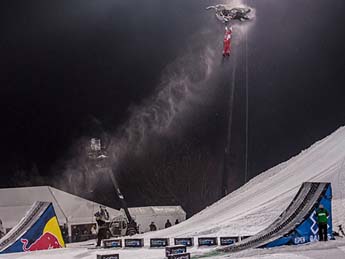
Editor's Note: ESPN announced in March, 2013, that the Moto X and Snowmobile Best Trick events would be discontinued.
Practice is over, and my run is set, now time to put it down smooth," tweeted extreme snowmobile rider Caleb Moore at the Winter X Games in Aspen last January 24. Later that day, as he attempted a routine backflip, the skis on his 450-pound snowmobile caught on the landing area; Moore flew over the handlebars and hit the snow, his vehicle plowing over him. He walked away from the crash, but later developed bleeding around his heart. A week later, the 25-year-old died.

Action sports -- only outsiders call them "extreme" -- have grown dramatically since their indie beginnings. ESPN created the X Games 18 years ago; Mountain Dew's "Dew Tour" followed a decade later; and Red Bull sponsors a wide range of increasingly crazy events, like "Crashed Ice," a downhill speedskating race held in cities. Slopestyle skiing, with its huge jumps and acrobatic stunts, will join snowboarding as a sanctioned event at next year's Winter Olympics in Sochi, Russia.
Today's action athletes are pushing themselves harder than ever, bringing the thin line between daredevilry and death to the forefront. In 2009, freestyle motocross (FMX) rider Jeremy Lusk became the first action-sports star to die in competition when he hit the ground headfirst while attempting a backflip. Since then, at least two others have died at events or in practice: Jim McNeil, another FMX rider, died after a crash in practice in 2011; and last year, champion freestyle skier Sarah Burke suffered fatal brain damage after crashing in a half-pipe training run.
Snowmobile racer "Monster Mike" Schultz watched Moore from the sidelines that day. "I was cringing," Schultz says. "They're doing some amazingly ridiculous things with these snowmobiles, and I know the consequences when it doesn't go right." In 2008, Schultz shredded his left knee so badly in a snowmobile crash that his leg had to be amputated. He still races, using a custom foot stirrup to keep his prosthetic on the pedal. So many amputees now populate action sports that in 2008, the X Games began staging races for them, called Adaptive events.
After Lusk's death, the Dew Tour decided to downgrade FMX, widely viewed as the riskiest event, from a contest to an exhibition. Participants now perform a set list of tricks rather than trying to outdo one another with more difficult moves. "That's Evel Knievel shit," says an executive involved in the discussions. "We want sports, not spectacle."
Former BMX pro Aaron Cooke, founder of the Athlete Recovery Fund -- which helps cover athletes' insurance and medical expenses -- is pushing riders to use helmets certified by the Consumer Product Safety Commission. This year, BMX riders at the X Games and on the Dew Tour will be required to use helmets made of harder foam than the noncertified ones most wear. (Others, like Schultz, wonder if the sports should mandate helmets like those used in motorcycle supercross, which pump air between the helmet and the head in case of collision.)
The day of Moore's death, ESPN, which televised his crash, said that it would "conduct a thorough review of this discipline.... Still, when the world's best compete at the highest level in any sport, risks remain." Twelve days later, the network decided to suspend freestyle snowmobiling at future X Games indefinitely.
But the perils of action sports are unlikely to go away. The X Games go international this year, with major contests in Spain, Germany, and Brazil, and prize money as high as $50,000 -- more than most athletes make in a year.
"They need to put some limits on what they're doing," says Schultz. "But I wouldn't even dream of knowing how to go about that. You still want to make it interesting and extreme. Put limits on it, and then it's...limited. It's a real catch-22."
More from Men's Journal:
-- Skis to Match Your DNA
-- Parkour: The Spiderman Sport




